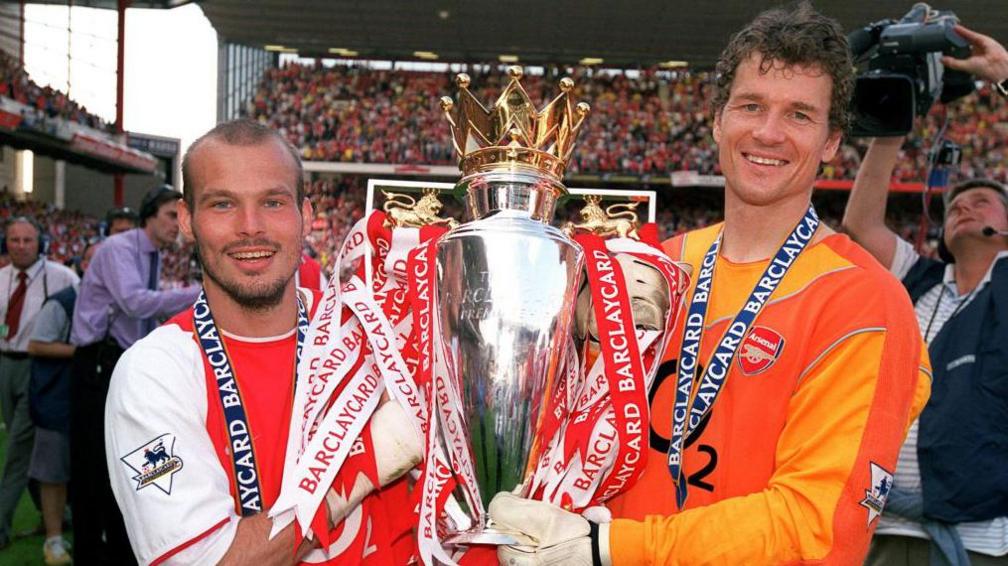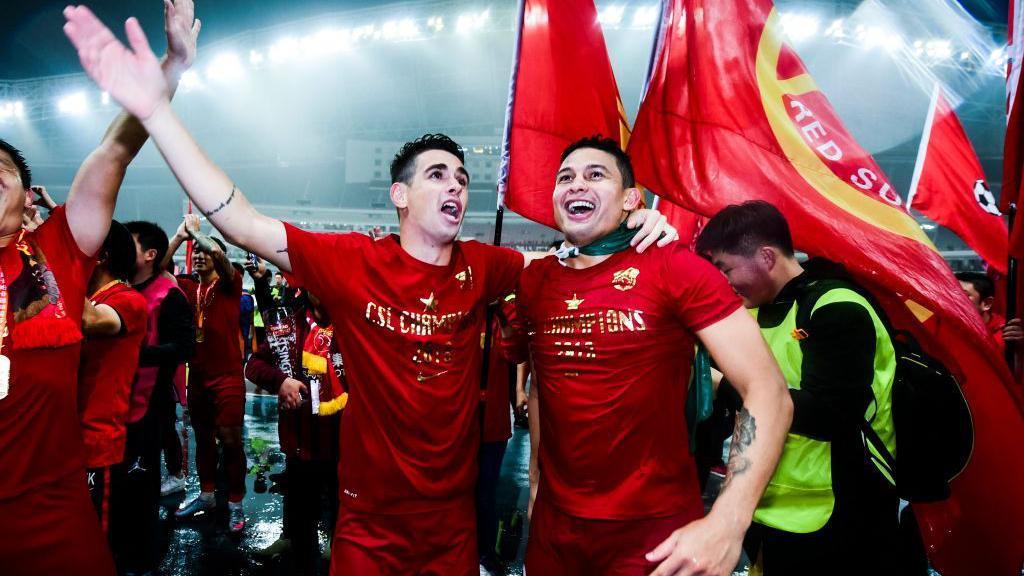dataDp/3575.jpeg
Futbol

Lehmann Taking 'Invincible Spirit' Into New Baller League
~3.2 mins read
Players earning £400 a game, goalkeepers unable to use their hands and ex-Premier League superstars rubbing shoulders with social media influencers... welcome to Baller League. Former Arsenal goalkeeper Jens Lehmann is one of the ex-professionals signed up as a manager, alongside fellow 'Invincibles' Freddie Ljungberg and Robert Pires when the season kicks off on Monday. The trio all played a big part in helping the Gunners make history in 2003-04, completing the Premier League season without losing a game. Baller League was launched by German entrepreneur Felix Starck in his homeland in 2024. It is a six-a-side format with 12 teams competing on indoor pitches every Monday at Copper Box Arena in London over 11 matchdays, with the top four teams in at the end of the season entering a 'Final Four' stage where they play a semi-final and a final to crown the champion. Luis Figo, John Terry, Ian Wright and Chloe Kelly are among the other managers, while influencers Angry Ginge and Miniminter will also lead teams. Although the Baller League title may not be as prestigious as the other trophies in Lehmann's cabinet, having won the Premier League, Serie A and Bundesliga during his 24-year career, "losing is not an option" for the former Germany international. "Sometimes I play charity games with Luis Figo, John Terry and Robert Pires and we always want to win," Lehmann told BBC Sport. "We won't take our teams and say, 'it doesn't matter if you lose'. They know they have to win. "If the Baller League can transfer that attitude from the managers into the squads then it's going to be very exciting." After retiring in 2011, Lehmann, 55, worked as a goalkeeping coach at Arsenal and was assistant manager at Augsburg - neither of those roles are likely to prepare him for Baller League, though. With limited time to work with players who are paid £400 for each matchday and rule twists - like long-range shots count double - it might come down to a strong relationship with Pires and Ljungberg in the dugout. "We have always stayed connected, it's always a pleasure to see them," Lehmann added. "I played padel in Ibiza with Robert [Pires] against my son Lasse and a friend of his and they thought they were winning, but they learned about the 'Invincible' spirit." Lehmann made 199 appearances for Arsenal between 2003 and 2008 - during a period many consider a golden era in the Premier League - and featured in all 38 league games during their 'Invincibles' campaign. The rivalry between the Gunners and Manchester United was at its peak with bosses Arsene Wenger and Sir Alex Ferguson fighting their respective corners as intense encounters played out on the field. "It wasn't just we played, hugged each other and then said, 'shall we go out tonight?' It was pure rivalry and people could feel that it was very honest and you could say on the pitch it was very hostile," Lehmann said. "People liked the emotions, the real commitment, the feeling of so many players from Chelsea, Liverpool, Manchester United and Arsenal that they gave everything for the people. People could feel we wanted to win no matter how." But Lehmann recognises the new generation of football fan is looking for an alternative product. "We had our time. The new format is very exciting," he added. "Felix [Starck] and all the guys working on it have seen that the new audience are getting distracted easily. You have to keep them entertained at every moment and the Baller League is addressing that. "The new generation talk about these new football formats, they talk about the Baller League and it's something they think could be a new addition to traditional football and so far they are right. "It's not a problem but it's a different user experience for the new generation. That's why the streamers are in, who I didn't know, but now I know how big they are." The inaugural version of the Baller League in Germany has already completed two seasons with footballers Mats Hummels and Lukas Podolski at the heart of things alongside chief executive Starck. "I call the Baller League the UFC of football," Starck told BBC Sport. "The UFC was very niche and they transformed it into the market share leader in combat sports. "We want to define small-sided football. The largest sport in the world does not have a definition yet."
All thanks to BBC Sport
dataDp/3575.jpeg
Futbol

Ten Years On, Can China Still Meet Grand Football Plans?
~4.7 mins read
When China's president, Xi Jinping, visited Manchester in October 2015, there followed a bizarre photo opportunity and a bold statement. The former was an image of two global leaders - Xi and then UK Prime Minister David Cameron - posing alongside Manchester City striker Sergio Aguero. The unlikely selfie went viral on social media. The latter laid out a target that seemed much more likely for a nation of 1.4 billion people - and the football world took notice. In a written interview with the news agency Reuters, President Xi said he wanted China's national team to become "one of the best in the world". Six months after Xi's visit to the UK, the Chinese government launched a strategy that aimed to make the country a "world football superpower" by 2050. In the long term, the president wanted China to host and be competitive at the men's World Cup. By 2030, he wanted China to be one of the best teams in Asia. When the strategy was announced, China were 81st in the Fifa world rankings. Today, they sit 90th - wedged between New Zealand and the Caribbean island of Curacao. China's only appearance at a men's World Cup remains at the 2002 tournament in Japan and South Korea, where they were eliminated in the group stage. Should they lose to Saudi Arabia and Australia in this month's international break, it would almost certainly end their hopes of reaching the next edition in 2026. Despite that, some of Xi's aims are already taking shape - his strategy having been set out over three stages, spanning 34 years. One of them was to get tens of millions of young people playing the sport regularly. China's community football projects have indeed been hugely upscaled, with pitches now accessible all over the country. "This absolutely kicked into high gear from 2016 - football pitches were springing up everywhere," says Dr Mike Gow - an expert in contemporary China at Edge Hill University. "You're never more than about 10 minutes' walk from either a half-size or full-size all-weather pitch. The scale of it is quite impressive." But while access has improved, adopting a football culture similar to Europe and the UK is proving more challenging. In 2018, David Sproer was working as a coach in Cologne when he was presented with an opportunity to work for the Shanghai Football Association as a youth coach in the women's game. "It felt like a gold rush," he says. "It felt like things were really taking off, and that Chinese football could make huge steps towards a brighter future." Sproer left the country, along with many other European coaches, during the Covid-19 pandemic. He says he has no regrets about his time in China, but believes parts of his experience shone a light on why the country is so dominant in Olympic sports such as gymnastics, diving and table tennis but has struggled in football, where cohesion and communication play a more important role. "Chinese kids are educated and socialised a little differently from European kids," he says. "They grow up with an understanding that there is always a right and a wrong answer. "You have to be a little bit more versatile in football than, say, diving. It's not about perfection, it's also about creativity." The growth of the game among young people has also suffered as a result of the perception of football in the country. In December 2024, former Everton midfielder Li Tie was sentenced to 20 years in prison for fixing matches and accepting bribes. He had been China's men's national team coach from January 2020 to December 2021. The saga was the latest in a string of corruption cases that have blighted Chinese football over many years. According to Sproer, they have had an impact on the number of parents willing to volunteer to help in organising youth teams. "Kids are under enormous academic pressure. The parents are under pressure in their jobs," he says. "So there isn't much time to volunteer, and there is also not this culture of volunteering, because football in China in the professional leagues doesn't have the greatest image." Three months before Li Tie's sentencing, Chinese football had suffered a blow, with a 7-0 defeat by bitter rivals Japan in World Cup qualifying. "This is like England getting hammered by Germany," says Dr Gow. "Fans were angry, but they were more exasperated. Exasperated at the state of the game, and exasperated at the level of corruption in the game." When Xi set out his football plan in 2016, it led to a wave of investment from Chinese private investors in British and European clubs. The Chinese Super League (CSL) had its own resurgence, with wealthy owners pumping money into clubs to finance moves for players such as Oscar, from Chelsea, and Hulk from Zenit St Petersburg. Now, only two Chinese investors have overall control of professional clubs in England - the Fosun International Group at Wolverhampton Wanderers, and Dai Yongge, whose tenure at Reading has been beset by financial crises and successive points deductions. And clubs in the CSL are counting the cost of their transfer spending, with Guangzhou Evergrande, who won eight domestic titles and two Asian Champions Leagues between 2011 and 2019, forced into liquidation in January as a result of unpaid debts. "A lot of entrepreneurs used the China football strategy as a pretext to move money out of China," Dr Gow says. "It's very difficult to get your money out of China, so they seized on this opportunity that there was a national policy. "Fairly quickly, within a two- or three-year period, the authorities came along and said 'no, this is not what we want you to be doing,' so they kind of closed the door on that outward investment." With the presence of Chinese investors dwindling at European clubs, and with the men's national team still struggling to make inroads on the pitch, it is tempting to write off Xi's ambitions already. But those who've spent time in the country still feel the targets can be met by 2050, with China's results in younger age groups signalling some progress. "Never underestimate them," says Dr Gow. "When you have the Chinese Communist Party and the People's Republic of China, and they come out with a plan like this, they tend to deliver the objectives."
All thanks to BBC Sport
Advertisement

Link socials
Matches
Loading...
